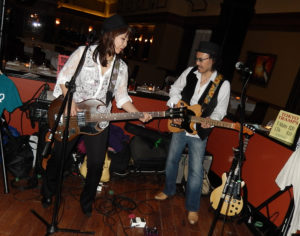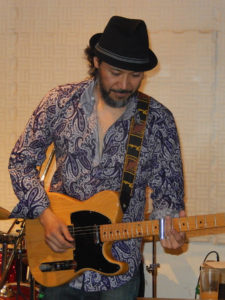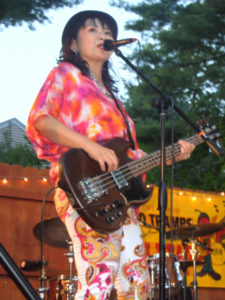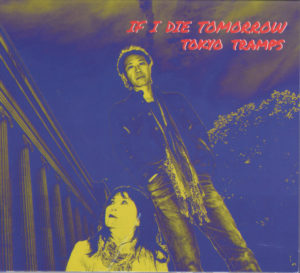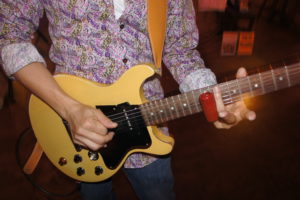Tokyo Tramps are at the zenith of their career in the greater-Boston/New England music scene. Just having released their sixth full length album, If I Die Tomorrow, they have been getting radio play like never before. Their chart action includes several songs from their CD, receiving air play in Massachusetts while a national chart has their CD at number 17, which coincided with a review in Blues Blast Magazine.
“We posted some of the chart action on Facebook from time to time,“ singer-songwriter-electric guitarist Satoru Nakagawa said of his trio‘s latest accomplishment. “We hired a publicist. He gave us all these mailing addresses for DJs.”
Tokyo Tramps bassist and second lead vocalist, Yukiko Fujii, who, as Nakagawa‘s wife has a 50/50 partnership, chimed in through out this interview.
“I sent out,” she said, “over 200 copies to DJs at radio stations including college and commercial and another 50 copies to public stations. Finally, we got some kind of buzz.”
If I Die Tomorrow was released over seven months ago, in October 2018, and, as radio stations usually prefer newer releases, the trio is happy to see all the recent radio activity for that recording. On a Massachusetts chart, Roots Music Report, seven songs from Tokyo Tramps’ If I Die Tomorrow CD are charting.
“That’s very, very encouraging,” Satoru said. “This is the best record we ever made, but at first we didn’t see any concrete results at all. So, even when we hired this new publicist, we were skeptical. He did reach out to us. I think it’s the first time we got a review in the Blues Blast. I think we hired the right guy, finally.”
Tokyo Tramps are ecstatic to know that a college radio station in Colorado is playing their songs every week. “That’s very pleasing,” he said. “Someone is finally taking a notice of what we are doing besides locally.”
Tokyo Tramps have a Japanese label and Japanese distribution for their CD. That connection resulted in some recent gigs in their native country where they were raised before coming to the United States to study and play music.
“It’s still going on,” Satoru said.
Tramps played some venues in Japan last March and for a week last May. Their trio does have some recognition in their native country. During their recent stint in the Land Of The Rising Sun, Satoru and Yukiko got to play with their original drummer from their first CD, which they recorded several years ago.
“He’s by far the best drummer we’ve played with,” Satoru exclaimed. “Everything was so smooth. We never have to fight. It’s like we’re just breathing together. It’s beautiful.”
“I wish we had that kind of drummer,” Yukiko said.
“I think every great band must be like that,” he said. “They can read each other’s minds. That’s what we’re looking for.”
Tokyo Tramps have got quite a CD to work with. If I Die Tomorrow is loaded with what critics and on air personalities are calling their greatest effort. They were very confident going into Ducky Carlisle’s Ice Station Zebra recording studio in Medford, Massachusetts last year.
“We knew this was gong to be a our best record,” Satoru said. “We spent nearly a year preparing for this album. We rehearsed so many songs. We were taking it so seriously. We were having fun making this record.”
To get to where they are now, Tokyo Tramps had to shed their previous image of being a traditional blues band.
“We’d been going to blues challenges and to Memphis. There was a time when I was leaning toward more traditional blues. Nothing happened and having tried three times(at blues challenges), I learned we are not going anywhere with this particular outlet. I think they are more interested in preserving traditions rather than supporting something new. We never saw ourselves as traditional blues artists. We’ve always had one foot in the blues and the other one in rock. Our mindset is more like The Rolling Stones or Eric Clapton. We use traditional but we like to write our own original music. Writing original music is definitely our goal. We are not a cover band.”
Their CD title, If I Die Tomorrow, sums up what Tokyo Tramps was feeling. It reflects on how they would like to be remembered if this was the last time on earth they could make their own musical statement. Yukiko said “We reached out with more freedom, what we are trying to do today. That was the last song we wrote. But, it’s probably right, the concept.”
“Its not literal, It’s more like at attitude. I just do my thing,” Satoru said.
Title track “If I Die Tomorrow” has the rising lead guitar line, thumping wide bass guitar, and splashes of organ that made many of Jimi Hendrix’s own works come to life.
“That’s Hendrix inspired, guitar wise,” he said. “Even the song structure is like that. That’s the last song I wrote. I felt we needed that blues rock riff, and that’s how I wrote. The riff pretty much dictated the song in my head.”
Another song from their latest disc, “Bluebird,” has a flow that keeps the song in motion through some tricky changes. The lyrics are about a wandering young soul who isn‘t quite sure what to do with himself. “That’ exactly how I felt,” Satoru said. “The song in the story about just getting out of college and not doing what he wants to do.”
Yukiko added: “He does not see the purpose of his life, and he’s searching and searching, that uncertainty.”
Yukiko Fujii’s contribution to the album’s songwriting includes her song “Why.”
“It’s a true feeling thing,” she said. “We’ve been trying here and there and everywhere, but it’s not happening. It’s always some kind of wall or obstacle comes up and why? Why? Why it’s not going well, and why can I not get what I want. The story is a metaphor. Behind the song there is a true feeling, true frustration through all these years.”
Satoru Nakagawa has long been interested in Louisiana Second Line music. He used to live in New Orleans and he loves that city’s music. Along with American blues, New Orleans music is his backbone. The album recorded by Tokyo Tramps before If I Die Tomorrow was where they tried to make the most out of the blues and New Orleans. This new album they recorded with more of a rock and roll vibe. Yet, their drummer, Tim Carmen, who loves funk, brought an open spaces approach to the new album.
“As we were working on the songs, it was only natural we both started talking about New Orleans funk music, The Meters, Neveille Brothers, Dr. John,” Satoru said. “It was only natural to incorporate that feeling to our songs we were writing in the moment. In some songs you can definitely hear that direct influence.”
“It worked,” Yukiko said.
Tokyo Tramps have long played out as a trio. That may have to change due to their inability to keep a drummer for more than a year or two :Currently, our biggest challenge is a drummer,” Satoru said. “We don’t have a steady one. That’s a true bummer because I love drums. I want to rock out. I want to play electric guitar with drums. Tim, who recorded with us, he’s just a great, great drummer. Originally, he left with his wife to California. That limits us. Now, we’re starting to think about duo gigs.”
Tokyo Tramps have had a surreal Spinal Tap experience in which that fictional movie band’s drummers kept dying and needing to be replaced.
“We’ve had so many drummers in the past. Luckily, we were always found the next one,” Satoru said. “The first five drummers were all Japanese. We were all in Berklee. They were there. We had plenty of drummers at that time. We were young. We didn’t mind working so hard, teaching them to learn new songs. Now at a different stage of our career, finding a good drummer….”
Tokyo Tramps had a Korean drummer for a while. His wife was diagnosed with liver cancer so they had to return to Korea for treatment. “All of a sudden,” Yukiko said.
“Everything happened in a month. We didn’t know what to say,” Satoru said. “That is how all of our relationships ended. Something always urgent came up rather than a falling out. They had to go.” Previous drummer Kosei Fukuyama in 2013 returned to Japan to help his nation’s efforts to restore itself after being hit by earthquakes.
Aside from their rotating cast of skin smackers, Tokyo Tramps have had to weather many storms in their adopted country. After recording six full length CD s and some EP s, having played over 111 venues and a few dozen festivals, Tokyo Tramps have had their share of ups and downs since forming their outfit in 1999. Formerly available club gigs dried up as the economy, neighborhoods, and musical tastes change.
“It comes and goes,” Satoru said. “It goes through stages.”
“It’s been 20 years,” Yukiko said. “The society changes. People change. Markets change. We grew older. We cannot be the same as 20 years ago. The music changed. Everything changed. It won’t be the same even if we get a group drummer. But we always try to find something new. So, that’s the basic story.”
Tokyo Tramps have come full circle since 1999. They began as a rock and roll outfit before turning to blues before their recent switch back to blues with rock and roll and New Orleans influences.
“We got into the blues circuit in 2011,” Satoru said. Yukiko said: “Around that time we tried the Blues Challenge. Severn or eight years ago, we were more on the rock side and more on the singer-songwriter side. I don’t know what the blues scene was in 1999.”
A lot of the restaurants that had booked the Tramps have closed or the ownership changed. Nowadays, they look to the suburbs for gigs. “We can hardly get a gig in Boston,” Yukiko said..
“Certain clubs in Cambridge and Somerville,” Satoru said, “they don’t book us any more. I don’t know why. What can I say?”
Asked the secret of their success for staying around for so long. “If you call this success,” Satoru quipped. “If you don’t stop, then you can keep going. “
“You can never stop. You need to keep going,” Yukiko echoes.
“I feel like I can do more. I truly believe that I am getting better,” he said. “As musicians we want to get better and better and better. Hopefully, at the highest point, I want to die. That’s how I want to leave the world, at the highest point. I don’t think about retiring. I just want to keep going, as long as I’m able.”
An unusually ambitious band, Tokyo Tramps, as always, have got a plan and a plan B for their next step. They are already planning another CD.
“We started working on the next album, actually,” Satoru said. “We are still in the writing, arranging stage. But, we definitely started thanks to that chart action. I finally, I finally feel I can move on. I got some reward from what I did. I’m OK now. I can move on.:”
“I’m so excited about working on the new album right now,” Yukiko said. “Hopefully, it will come out as soon as possible in some way.”
When asked if they had any last words for this article both said “We need a drummer.”
